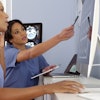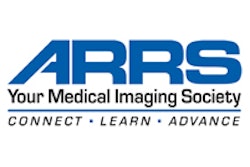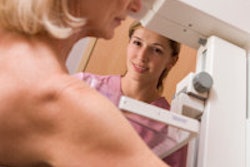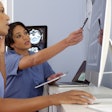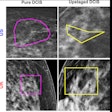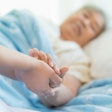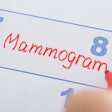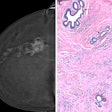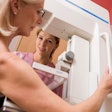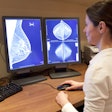Screening mammography is under intense scrutiny, with critics questioning its efficacy and calling attention to its harms -- including patient anxiety in the face of false positives. Direct and proactive education offered by mammographers can counter these questions, according to research presented at the recent American Roentgen Ray Society (ARRS) meeting.
Presenter Dr. Jiyon Lee, from NYU Langone Medical Center, and colleagues found that women who attended radiologist-provided educational sessions reported high levels of satisfaction about their participation, improved understanding of mammography screening, and decreased anxiety about both breast cancer and screening. The sessions were given at a bank, a law firm, a public library, a university club, and the medical center.
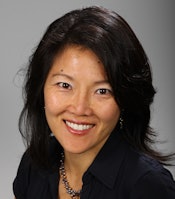 Dr. Jiyon Lee from NYU Langone Medical Center.
Dr. Jiyon Lee from NYU Langone Medical Center.
"Screening mammography and improved cancer therapy have led to decreased mortality rates, but the negative publicity about mammography's so-called harms continues to distract women and detract from screening compliance," Lee told session attendees. "The tacit implication and overt suggestion is that the magnitude of mammography's 'harms' overcomes the benefit of saving a life."
The educational sessions her team developed provide an opportunity to deliver accurate information to the public, she said. Participants were invited to the one-hour sessions by conventional mail and email. The sessions included a lecture and a question-and-answer period.
The lectures used lay language and radiology images, and they covered background information on cancer, screening guidelines, and areas of debate. Participants completed anonymous two-part surveys that inquired about their background, their attitudes toward breast cancer screening, and the sessions' impact.
One hundred and seventeen women completed surveys, with 62% reporting no breast cancer risk factors. Sixty-six percent had undergone mammography (86% of these in 12- to 16-month intervals). On a scale of 1 to 5, with 5 being the most important, the women ranked factors that helped them comply with screening as follows:
- Accurate information -- 4.5
- Personal priority -- 4.2
- A reminder from their doctor -- 4
- A reminder from the screening facility -- 3.4
- Influence from friend/family -- 3.1
Before the lecture, 42% of the survey respondents reported anxiety regarding screening; they attributed the anxiety to uncertain exam results, fear of pain, waiting time for results, the possibility of more procedures, general anxiety, and known risk factors. Ninety-eight percent said that receiving immediate results from their mammogram could reduce anxiety (with 55% indicating a 75% to 100% decrease), and 93% said that a radiologist consultation with images could lower anxiety (with 51% indicating a 75% to 100% decrease).
After the lecture, women used the five-point scale again and reported better understanding of the topic (4.7), encouragement to screen (4.6), and reduced anxiety (4). In addition, all of the women understood the need for prior films, that being recalled does not necessarily mean a cancer diagnosis, and that screening is important even if a woman does not have a family history of breast cancer, the researchers found.
Lee's team hopes the study results will encourage other radiologists to develop and implement proactive, public outreach on the topic of breast cancer screening, which could improve women's understanding and screening compliance and reduce their anxiety.
"For women, a mammogram can be unfamiliar at best and terrifying at worst," Lee told AuntMinnie.com. "But as breast imagers, we're the experts, and we can give women good information about this specific medical test in friendly, hopeful, and empowering way."


